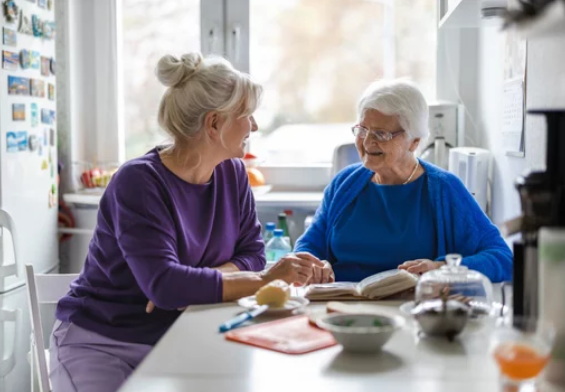Share This Checklist
1. Assess Their Needs and Abilities
Before setting a routine, you need to understand what kind of care they actually need.
1.1 Identify Their Daily Care Needs
Your parents’ care requirements will depend on their health, mobility, and cognitive abilities.
How to do this:
- Make a list of what they can do independently versus what they need help with.
- Consider activities like bathing, dressing, eating, medication management, mobility, and hygiene.
- Talk to their doctor about any medical needs that require daily attention.
Why it matters:
- Ensures they receive proper care without losing independence where possible.
- Helps you create a realistic daily plan that covers their essential needs.
1.2 Consider Their Preferences and Comfort
Routine is important, but it should align with their lifestyle and habits.
How to do this:
- Ask what times of day they feel most energetic and alert.
- Keep meals, rest times, and hobbies consistent with what they are used to.
- Be flexible if their preferences change over time.
Why it matters:
- A routine they enjoy is easier to stick to and reduces resistance.
- Helps maintain their sense of control and dignity.
2. Structure the Daily Routine
Once you know their needs and preferences, you can create a schedule that balances care, safety, and independence.
2.1 Set a Morning Routine
Mornings set the tone for the day. A structured start helps them feel refreshed and ready.
How to do this:
- Help with bathing, dressing, and grooming if needed.
- Encourage light stretching or movement to loosen up stiff joints.
- Serve a nutritious breakfast with any necessary morning medications.
Why it matters:
- A well-paced morning routine reduces stress and confusion.
- Proper hydration, nutrition, and movement help with energy levels and mobility.
2.2 Plan Meals and Hydration
Good nutrition is key to keeping them healthy and preventing medical issues.
How to do this:
- Schedule meals at the same times daily to support digestion and medication timing.
- Prepare easy-to-eat, nutrient-dense foods tailored to their dietary restrictions.
- Encourage hydration by offering water, tea, or broth throughout the day.
Why it matters:
- Poor nutrition leads to weakness, falls, and cognitive decline.
- A regular meal schedule makes medication management easier.
2.3 Include Movement and Physical Activity
Daily movement helps prevent stiffness, muscle loss, and falls.
How to do this:
- Encourage gentle exercises like stretching, walking, or chair yoga.
- If mobility is limited, try seated exercises or guided movement therapy.
- Take short walks outside if possible, even if it is just to the mailbox.
Why it matters:
- Improves circulation, mood, and overall health.
- Helps maintain independence and reduces injury risk.
2.4 Schedule Social Interaction and Mental Stimulation
Staying engaged and connected is just as important as physical health.
How to do this:
- Encourage phone calls, video chats, or in-person visits with family.
- Plan activities like puzzles, reading, music, or crafts to keep their mind active.
- If possible, involve them in simple household tasks to give them a sense of purpose.
Why it matters:
- Reduces feelings of loneliness and depression.
- Keeps their brain engaged and helps prevent cognitive decline.
2.5 Rest and Relaxation Time
Seniors may need more downtime, but too much inactivity can lead to boredom and depression.
How to do this:
- Encourage short naps if needed but avoid long ones that disrupt nighttime sleep.
- Create a calm environment for reading, watching TV, or listening to music.
- Ensure they have a comfortable place to rest with proper support.
Why it matters:
- Helps maintain a healthy sleep schedule.
- Gives caregivers a break while keeping seniors comfortable and engaged.
2.6 Evening and Bedtime Routine
A predictable evening routine promotes better sleep and relaxation.
How to do this:
- Serve a light dinner that is easy to digest.
- Assist with hygiene tasks like brushing teeth, using the restroom, and changing clothes.
- Dim lights and reduce noise at least an hour before bedtime.
Why it matters:
- A structured bedtime routine improves sleep quality.
- Helps manage nighttime restlessness or confusion (especially for dementia patients).
3. Adjust the Routine as Needed
Care needs change over time, so routines should be flexible.
3.1 Monitor Their Health and Energy Levels
If they seem exhausted or struggle with tasks, their routine may need adjustments.
How to do this:
- Track how they respond to the schedule over a few weeks.
- Make small changes if they are overwhelmed or need more rest.
- Check in with their doctor if new health concerns arise.
Why it matters:
- Keeps their daily routine manageable and stress-free.
- Ensures they are getting enough activity without overexertion.
3.2 Be Flexible and Patient
Not every day will go according to plan, and that is okay.
How to do this:
- Allow for some variation in meal times, activities, and rest.
- If they resist certain tasks, try a different approach or time of day.
- Remember that their mood, energy, and health will fluctuate.
Why it matters:
- Prevents frustration for both caregivers and seniors.
- Encourages a more natural, relaxed daily experience.
Final Thoughts
Creating a daily care routine for aging parents is not about strict schedules. It is about structure, comfort, and flexibility to keep them safe, healthy, and engaged. Keep things predictable, but do not be afraid to adapt when needed. The goal is to support their independence while giving them the care they need.
Related Content

